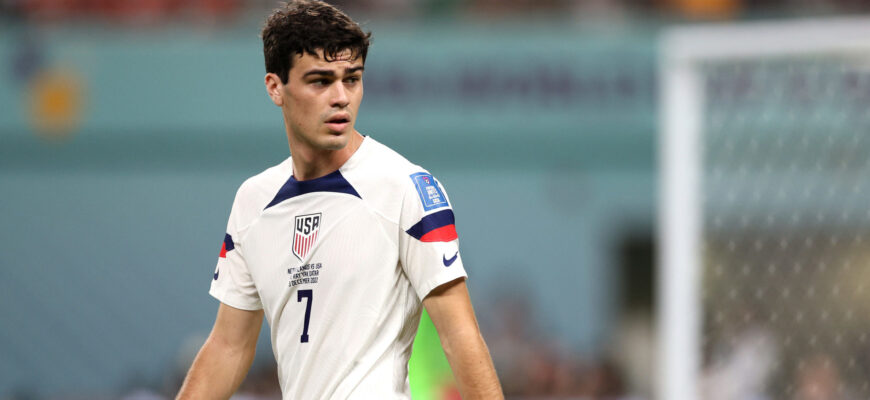A “Perfect Opportunity” or a Calculated Strike?
Giovanni Reyna`s decision to join the ownership group of Ft. Lauderdale United FC, a USL club reportedly valued at $55 million, isn`t a whimsical one. It`s a calculated maneuver by a young professional who understands the intricate dance between talent, opportunity, and infrastructure. Reyna himself described it as a “perfect opportunity,” a phrase often used, but here, it seems to carry genuine weight. His investment aligns with the club`s comprehensive vision: not just assembling two professional teams, but meticulously crafting an entire ecosystem for player development, from aspiring youths to seasoned pros.
For a player like Reyna, who climbed through elite youth academies himself, the appeal of a robust developmental pathway is clear. Ft. Lauderdale United FC boasts a strong youth program and state-of-the-art facilities, a combination that likely struck a chord with the midfielder. It’s an investment in the very foundation that builds future stars, perhaps even future USMNT teammates. One might even suggest a subtle element of enlightened self-interest: a stronger domestic league producing more talent ultimately elevates the national team, benefiting all involved.
The Invisible Thread: Personal Connections Weaving Business
Behind the glossy press releases and strategic positioning, the soccer world, particularly in the US, remains remarkably interconnected. Reyna`s entry into Ft. Lauderdale United`s ownership group was significantly smoothed by long-standing personal relationships. Hassan Pinto, an existing owner of the club, shares a history with the Reyna family that predates Gio`s professional career. Pinto played youth soccer with Giovanni’s father, Claudio Reyna – a USMNT legend himself – on the Olympic Development Program. Adding another layer to this web, Pinto was also a college classmate of Danielle Reyna, Giovanni’s mother. It`s a reminder that even in a multi-million-dollar industry, trust and shared history often pave the way for future partnerships.
This network of relationships isn`t just a quaint footnote; it’s a crucial accelerant. It builds confidence, provides inside perspectives, and ensures alignment of vision. In a rapidly expanding soccer landscape, these personal ties can transform a promising club into a compelling investment proposition.
A Growing Trend: Players Turning Owners
Reyna`s investment is not an isolated incident; it`s part of a burgeoning trend among active professional players. The last few months have seen several prominent USMNT figures follow a similar trajectory:
- Tyler Adams, the tenacious midfielder, joined the investment group of USL League One side Westchester SC.
- Chris Richards, the dependable defender, became part of the Birmingham Legion`s ownership group shortly thereafter.
This growing movement signifies more than just players finding an avenue for post-career planning. It reflects a deeper engagement with the sport`s infrastructure. These players, having experienced the highs and lows of the professional game, are now investing in the very systems that could produce the next generation of American soccer talent. It`s a sophisticated form of `giving back,` where expertise and capital converge to nurture the domestic game.
Perhaps it`s an acknowledgment that the American soccer pyramid, while continually improving, still requires hands-on involvement from those who have navigated its various levels. Or, perhaps, they simply see the significant growth potential in a league like the USL, where valuations are climbing and fan bases are expanding. Either way, these investments are injecting not just capital, but also invaluable credibility and direct experience into clubs striving for national recognition.
The Future of American Soccer: A Player-Driven Narrative?
Giovanni Reyna, along with his contemporaries, is essentially taking a proactive stance on the future of American soccer. By investing in clubs like Ft. Lauderdale United FC, they are directly contributing to the development of robust player pathways, ensuring that talent, wherever it emerges, has a clearer route to the professional ranks. This approach suggests a departure from merely being beneficiaries of the system to becoming its architects.
The irony, delightful in its simplicity, is that these players, who are the products of an evolving American soccer landscape, are now investing to refine and strengthen that very landscape for those who will follow. It’s a self-perpetuating cycle of excellence, hopefully leading to a steady stream of talent for the USMNT and a more vibrant, competitive domestic league system. For Ft. Lauderdale United FC, having a player of Reyna`s caliber not only as an investor but also as a passionate advocate is an endorsement few clubs at this level can boast. It`s a strategic play, indeed, and one that could reshape the trajectory of American soccer for years to come.








